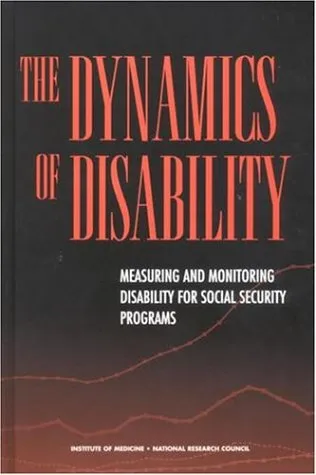The Dynamics of Disability: Measuring and Monitoring Disability for Social Security Programs
4.0
Reviews from our users

You Can Ask your questions from this book's AI after Login
Each download or ask from book AI costs 2 points. To earn more free points, please visit the Points Guide Page and complete some valuable actions.Related Refrences:
Introduction to "The Dynamics of Disability: Measuring and Monitoring Disability for Social Security Programs"
"The Dynamics of Disability" is an insightful and comprehensive exploration into one of the most critical aspects of social security in the modern era—determining, measuring, and monitoring disability. Written by the Committee to Review the Social Security Administration's Disability Decision Process Research under the National Research Council, this book seeks to address the challenges and complexities inherent in assessing disability for Social Security programs in the United States. The publication offers a blueprint to evaluate current methods and suggests evidence-driven strategies to strengthen disability determination processes, ensuring fairness, consistency, and adaptability within a constantly changing societal and economic landscape.
The book serves not only as a resource for policymakers, researchers, and disability advocates but also as a guide for anyone interested in understanding the interplay of medical, vocational, and societal factors in defining disability. With a multidisciplinary approach, it highlights the nuances of the U.S. disability determination system while offering actionable recommendations for improving efficiency and equity across the board. Whether you are a policymaker, a scholar, or simply someone seeking clarity on disability measurements, this book provides a much-needed perspective on a topic at the heart of public welfare systems.
Detailed Summary of the Book
At its core, "The Dynamics of Disability" delves into the dynamics of how disability is defined, measured, and monitored for decision-making in Social Security programs managed by the Social Security Administration (SSA). The book evaluates the key processes involved in determining eligibility for programs such as Social Security Disability Insurance (SSDI) and Supplemental Security Income (SSI), offering a meticulous analysis backed by data and academic research.
The authors outline the following areas extensively:
- The historical and policy context of disability determination in the United States.
- The challenges associated with measuring disability in dynamic social and work environments.
- Methodological and technological advancements to improve decision-making accuracy.
- Proposals for innovations in disability metrics and classification systems, incorporating multidisciplinary frameworks.
By addressing these facets, the book not only informs but also paves the way for reforms—an essential step in making disability programs more inclusive and responsive to the needs of the population.
Key Takeaways
- Disability is a multidimensional construct influenced by medical, occupational, and social factors.
- The current SSA disability determination process requires modernization to adapt to rapidly evolving definitions of work and disability.
- Creating more nuanced measures of disability will enable policymakers to better assess eligibility, reduce errors, and ensure equitable access to benefits.
- Collaboration between policymakers, researchers, and technology experts is critical for addressing gaps in existing disability metrics.
These takeaways highlight the importance of using a comprehensive, systematic approach to ensure fair and effective delivery of disability benefits.
Famous Quotes From the Book
"Disability is not a fixed condition but rather an ever-shifting spectrum of limitations shaped by external circumstances and opportunities."
"Measuring disability requires not just an understanding of individual impairment but also the societal context that defines functionality and inclusion."
"The administration of disability-related programs must balance compassion with precision, ensuring equitable access while safeguarding resources."
Why This Book Matters
In an era where disability benefit systems are struggling to cope with increasing demands, "The Dynamics of Disability" is a clarion call for reform and innovation. The book doesn't merely diagnose the issues—it also provides frameworks and methodologies to address them with impact. Policymakers, researchers, and healthcare providers alike will find its insights invaluable for creating a more resilient, data-driven, and equitable system of disability determination.
Moreover, the book underscores the broader implications of disability measurement, bridging the gaps between healthcare, economics, and social justice. Its relevance lies in its potential to positively impact millions of lives by ensuring that disability programs are more inclusive, accurate, and fair. For decision-makers tasked with shaping the future of disability policies, this book is an indispensable resource.
Free Direct Download
You Can Download this book after Login
Accessing books through legal platforms and public libraries not only supports the rights of authors and publishers but also contributes to the sustainability of reading culture. Before downloading, please take a moment to consider these options.
Find this book on other platforms:
WorldCat helps you find books in libraries worldwide.
See ratings, reviews, and discussions on Goodreads.
Find and buy rare or used books on AbeBooks.
1626
بازدید4.0
امتیاز0
نظر98%
رضایتReviews:
4.0
Based on 0 users review
Questions & Answers
Ask questions about this book or help others by answering
No questions yet. Be the first to ask!













